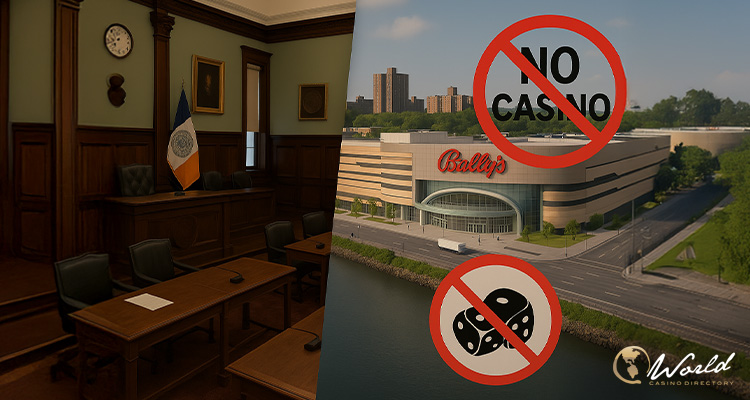A major casino development proposal in the Bronx has hit a decisive roadblock after the New York City Council voted to reject critical land-use changes that were central to the plan. This decision significantly narrows the pool of applicants competing for up to three downstate casino licenses expected to be awarded by the end of the year.
On Monday, the Council voted overwhelmingly—28 to 9—to deny Bally’s Corporation the zoning approvals needed to proceed with constructing a casino and hotel complex in the Throgs Neck neighborhood. The move effectively eliminates Bally’s from contention, reducing the number of remaining competitors to seven.
Bally’s had aimed to transform approximately 16 acres of land adjacent to Ferry Point Park into a sprawling entertainment complex. The proposed development included a 500-room hotel, a half-million-square-foot gaming facility, retail shops, a 2,000-seat event center, and large-scale parking accommodations. However, since the land is designated as city parkland, the project hinged on a zoning amendment that the Council has now firmly rejected.
Member Deference Sinks Development
Council Member Kristy Marmorato, who represents the district where the casino was proposed, spearheaded the motion against the rezoning. Her stance was pivotal, given the Council’s long-standing practice of “member deference,” an informal yet powerful tradition where Council members defer to the wishes of a colleague representing the affected area on land-use decisions.
“If I make a promise to my community, I follow through,” Marmorato stated, defending her vote. She referred to the proposal as a form of “predatory development” and emphasized that her position was shaped by feedback from residents, local leaders, and other stakeholders.
Marmorato’s comments on the Council floor echoed sentiments expressed earlier by local residents and members of the community board, which had also voted overwhelmingly against the project back in March. Public opposition was rooted in fears of increased crime, congestion, and a lack of clarity about the promised community benefits.
“This is not real economic development,” she added, according to the New York Post. “This is not housing, a hospital, or community improvements. This is a casino.”
Bally’s and City Officials React with Disappointment
The Council’s decision came as a surprise to Bally’s leadership. Soo Kim, the company’s chairman, expressed frustration following the vote, saying he was “surprised and disappointed” that lawmakers turned down a proposal he believes would have brought significant economic value to the city’s most impoverished borough.
Kim claimed Bally’s had met every condition laid out by Marmorato, calling into question whether the negotiations had been conducted “in good faith.” Despite the setback, Kim said he was still “processing” the full implications of the vote, but acknowledged that the outcome made the project’s future prospects “not looking good.”
Mayor Eric Adams, who had previously supported the initiative, also voiced dissatisfaction with the Council’s action. In a statement, spokesperson William Fowler said the administration was “reviewing its options in response to this vote.”
Fowler added, “The City Council’s disapproval of this Bronx bid pits boroughs against one another and leaves the Bronx unable to even have a shot at benefiting from the potential of new jobs and new investment in their community.”
Adams has five days following the Council’s vote to issue a veto, though any attempt to override the Council’s decision would require a two-thirds majority.
Political Fallout and Remaining Contenders
The rezoning defeat has stirred debate among city and state leaders. State Assemblyman Michael Benedetto, whose district includes the proposed site, did not conceal his frustration. “Why would they deprive the Bronx of this project?” he asked, calling the Council’s rejection “terrible” and saying he was “embarrassed” by the decision.
The Bronx Democratic Party had expressed support for the development, although several Bronx Council members voted against or abstained from Monday’s final vote. The split reflects the wider uncertainties about large-scale casino development in residential areas, despite the promise of jobs and revenue.
Mara Davis, a spokesperson for the City Council, clarified that decisions on casino developments are treated differently from other land-use proposals like housing. “Council members have their own individual perspectives on the value of potential casinos in New York City, which contributed to their votes,” she noted.
High-Stakes Race Narrows
With Bally’s now sidelined, seven proposals remain in contention for one of the coveted licenses. These include high-profile bids such as Steve Cohen’s $8 billion Metropolitan Park near Citi Field, the Jay-Z-backed Caesars Palace in Times Square, the Freedom Plaza project near the United Nations, The Avenir by the Javits Center, The Coney in Brooklyn, and bids by existing racino operators Resorts World NYC in Queens and MGM’s Empire City in Yonkers.
Bally’s had purchased operational rights to the former Trump Golf Links at Ferry Point in 2023 for $60 million. The deal included a clause obligating the company to pay the Trump Organization an additional $115 million if a casino license was secured—a prospect that now appears unlikely.
The Council’s decision underscores the influence of local politics and public opinion in shaping large-scale urban development. For Bally’s, a multibillion-dollar venture has been halted, not by economic infeasibility, but by political resistance from the community it aimed to transform.



